The 10 Best-Written Novels of All Time (Part 1)
An Opinion Article

There are many books that are considered to be "great," and yet we're never really told what makes them so great. Is it because they have something that other literature of the time didn't? Is it because they are endearing? Is it because they have characters that defy convention, and do as they please in a world against them? Why is it that certain novels are valued over others?
I have chosen to define this article by exactly what it is in order to narrow down the choices that I believe should go on the list (and this is novels only, or Shakespeare would probably just be all ten...). In order to choose these books, I went from a list of one hundred and cut it down to ten with my final point being to rearrange them according to what I think should be at the top to bottom.
Note: This is NOT a list of my personal favourite books of all time, I tried to leave out personal opinion when making this list. Also, I have tried to make this list accessible by looking at the books that a lot of people would have at least heard of. Finally, children's books, poetry, plays, and travel writing will not be included in this list since the title clearly states 'novels'.
When it comes down to it, most novels are written well, but only a few are written amazingly. Then, even less so are written to become the greatest written novels of all time—so let's look at which ten novels I chose as the top ten best written novels of all time.
Oh, and only one per country...
10. All the Pretty Horses by Cormac McCarthy (USA)
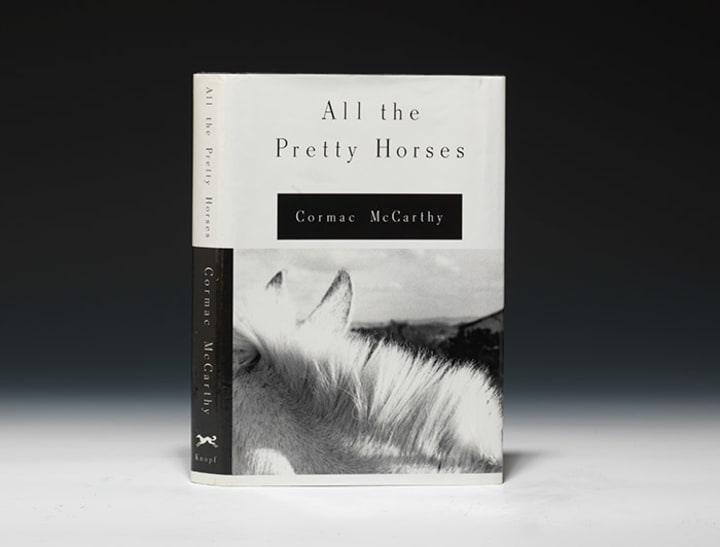
“That night he dreamt of horses in a field on a high plain where the spring rains had brought up the grass and the wildflowers out of the ground and the flowers ran all blue and yellow far as the eye could see and in the dream he was among the horses running and in the dream he himself could run with the horses and they coursed the young mares and fillies over the plain where their rich bay and their rich chestnut colors shone in the sun and the young colts ran with their dams and trampled down the flowers in a haze of pollen that hung in the sun like powdered gold and they ran he and the horses out along the high mesas where the ground resounded under their running hooves and they flowed and changed and ran and their manes and tails blew off of them like spume and there was nothing else at all in that high world and they moved all of them in a resonance that was like a music among them and they were none of them afraid neither horse nor colt nor mare and they ran in that resonance which is the world itself and which cannot be spoken but only praised.”
All the Pretty Horses is one of my favourite American Novels of all time. It is written is such a post-modernist style with a clear conscious that relates back to the days of the American West. The descriptions are raw and beautiful, the imagery of horses and the various metaphors that surround them. McCarthy's writing has always been great and I once had a friend who stated that their favourite novel of all time was Blood Meridian also by Cormac McCarthy - it goes to show how relevant he still is even though he is very old. All the Pretty Horses is such a brilliantly and beautifully written novel that it starts off The Border Trilogy with such incredible force it makes you never want to finish the series.
Other American Novels That Could've Made the List:
Moby Dick by Herman Melville—it didn't make the list because I think everyone knows this is well written already.
Absalom, Absalom! by William Faulkner—it didn't make the list because I didn't want to sit here forcing you to read my favourite American Novel that nobody else seems to like.
Kafka was the Rage by Anatole Broyard—it didn't make the list because of how obscure and inaccessible it is. I felt like not everyone would appreciate this novel like I did.
9. The Thorn Birds by Colleen McCullough (Australia)
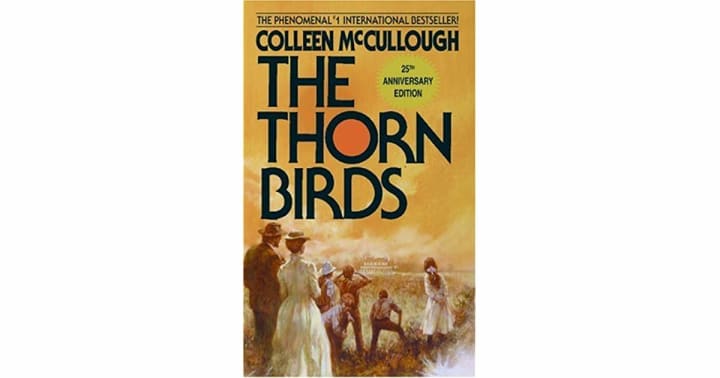
“We can know what we do wrong even before we do it, but self-knowledge can't affect or change the outcome, can it? Everyone singing his own little song, convinced it's the most wonderful song the world has ever heard. Don't you see? We create our own thorns, and never stop to count the cost. All we can do is suffer the pain, and tell ourselves it was well worth it.”
This Australian classic is normally called its country's answer to Gone With the Wind and is definitely a contender for one of the best novels ever written. The characters are so thorough with Meggie being one of the most incredible female leads you'll ever encounter because of her resilience against all that she goes through. Scenes of extreme violence, fires, animal cruelty, danger and tragedy colour the novel and create a feeling that can only be described as deep melancholia. It is an orchestral masterpiece that once you have read it, you will never be able to recreate the first experience ever again. It is too beautiful for words to say.
Other Australian Novels That Could've Made the List:
Oscar and Lucinda by Peter Carey—this didn't make the list because truly, it isn't as great as The Thorn Birds.
Picnic at Hanging Rock by Joan Lindsay—it didn't make the list because I really do believe that the film is more iconic in terms of Australian Media Culture than the book is. Even though it's good, it isn't as good as The Thorn Birds as a text. But as a film, it is probably THE Australian piece of cinema.
The Secret River by Kate Greenville—it didn't make the list because of how obscure it is and how little people know about it really.
8. The Maias by Eça De Queirós (Portugal)
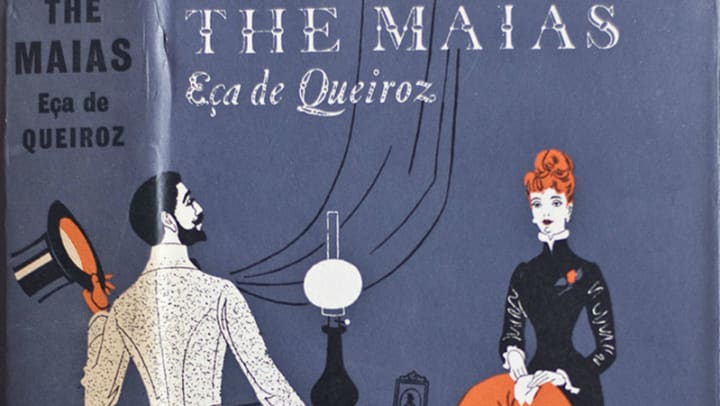
“If women don't show up, they care, that's in Portugal for all natural resources. Everything matters here. Laws, ideas, philosophies, theories, subjects, aesthetics, sciences, styles, industries, fashions, manners, jokes, all come to us in crates for the bellboy. Civilization costs us dearly, with customs duties: and it is all second hand, it was not made for us, it makes us short on the sleeves... ”
This one was introduced to me by a friend of mine known only as "Hop." He's from Portugal and was studying this book at school, he told me about it and I was immediately drawn to the story. I went to buy a translation straight away and was absolutely shaken by the beauty of the language, the precision of the structure, the metaphor, the secrecy, and the way in which the reader is kept in the dark for so long about so many things that are slowly revealed one by one as the plot unravels. It is so beautifully written that I doubt that you'll put it down once it is lifted. I know I couldn't. It is a beautiful book that is taught in schools across Portugal—a brilliantly written novel to study. They are so lucky!
Other Portuguese Novels That Could've Made the List:
The Book of Disquiet by Fernando Pessoa—it didn't make the list because honestly, it was a coin toss that decided. Such a close call but sorry Pessoa, you didn't win the coin toss.
Blindness by Jose Saramago—it didn't make the list because I think that it's slightly overdone when we write lists about well-written books. We are already well aware of the fact that Blindness is a great novel.
Captains of the Sands by Jorge Amado—this one didn't make the list because of the fact it is just really not as good as The Maias. It is very good, but it falls short on the beauty of language. The Maias is just better written in terms of beauty and tragedy.
7. Jane Eyre by Charlotte Bronte (Great Britain)
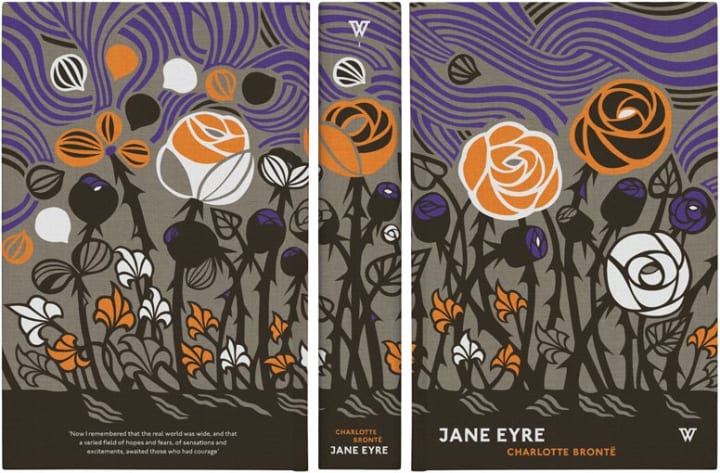
“It is in vain to say human beings ought to be satisfied with tranquillity: they must have action; and they will make it if they cannot find it. Millions are condemned to a stiller doom than mine, and millions are in silent revolt against their lot. Nobody knows how many rebellions besides political rebellions ferment in the masses of life which people earth. Women are supposed to be very calm generally: but women feel just as men feel; they need exercise for their faculties, and a field for their efforts, as much as their brothers do; they suffer from too rigid a restraint, to absolute a stagnation, precisely as men would suffer; and it is narrow-minded in their more privileged fellow-creatures to say that they ought to confine themselves to making puddings and knitting stockings, to playing on the piano and embroidering bags. It is thoughtless to condemn them, or laugh at them, if they seek to do more or learn more than custom has pronounced necessary for their sex.”
Charlotte Bronte's Jane Eyre is often called one of the greatest written novels in Britain, but is rarely recognised internationally. I would like to state why I have chosen it for my own top ten. The reason is because it offers various things that were still in preparation during the 19th Century—the first is a female lead, the second is a female lead in the gothic, and the third is the domestic gothic. The next reason is because the book itself has since become iconic as a piece of quintessentially British Literature. It is an important aspect of culture, especially regarding the development of the female lead and female writer.
Other British Novels That Could've Made the List:
Great Expectations by Charles Dickens—I think that this one purely didn't make the list because it is so overdone and has since become a little cliché to put on lists like this.
Wuthering Heights by Emily Bronte—out of the two of these novels, I am sorry but Jane Eyre is ever so slightly better
Frankenstein by Mary Shelley—it isn't really set in England and so, you don't get the British feel even though it's written by a British woman. So, for that reason, Jane Eyre won over Frankenstein.
6. At Swim-Two-Birds by Flann O'Brien (Ireland)
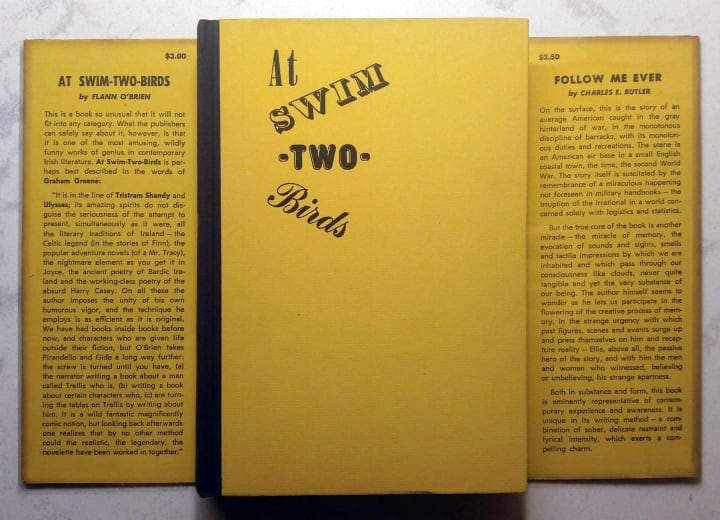
“When a man sleeps, he is steeped and lost in a limp toneless happiness: awake he is restless, tortured by his body and the illusion of existence. Why have men spent the centuries seeking to overcome the awakened body? Put it to sleep, that is a better way. Let it serve only to turn the sleeping soul over, to change the blood-stream and thus make possible a deeper and more refined sleep.”
At Swim-Two-Birds is an underrated classic. It is well-known amongst the reading community as a post-modern masterpiece with some witty, dark, and strange as hell language. The book is well written in every sense of the word, and has a brilliant plot. The book also has one thing that a lot of books don't really do properly nowadays, and that is introspection. In this novel, you'll find that introspection is raw and often difficult to read, and that's the whole point. I feel like this type of introspection in literature has really died out since.
Other Irish Novels That Could've Made the List:
Breakfast on Pluto by Patrick McCabe—it didn't make the list because I'm sure you don't want me to sit here rambling on about my favourite comedy novel. Also, I feel like At Swim-Two-Birds is better written.
Ulysses by James Joyce—I don't feel like this novel is as good as everyone makes it out to be, and by everyone I mean by every hipster who has pretended to read it.
Dracula by Bram Stoker—Again, one that appears on every "best written" list I think, and well, we get it. Dracula is very well-written yes.
5. The Beast Within by Emile Zola (France)
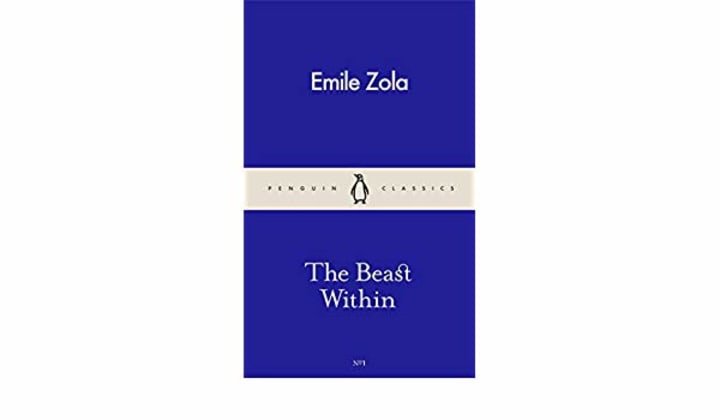
“As if one killed by calculation! A person kills only from an impulse that springs from his blood and sinews, from the vestiges of ancient struggles, from the need to live and the joy of being strong.”
Emile Zola's most perfect novel in my opinion, but also one of the greatest novels ever written. The novel has some well-developed characters, and an air of brutal violence. It shows humans at their best and at their most animal. It shows relationships fall apart through the affairs of others, through money and gain, and finally, through pure irony. Irony starts the novel and irony ends it, and it is quite possibly the best possible case of it I have seen in any French Novel ever. Zola is an incredible writer and this book should show you exactly why.
Other French Novels That Could've Made the List:
Les Miserables by Victor Hugo—I think that everyone is in agreement that this book is one of the best novels ever written, and so, I did not include it. It is far too well known and I wanted to give you something different to read.
The Masterpiece by Emile Zola—as much as I love and adore this novel (it is another one of my favourite Zola novels), I think that The Beast Within has slightly more to offer. It is still a great novel though.
Madame Bovary by Gustav Flaubert— think that this would be a great contender but, in a lot of ways including language, The Beast Within tends to show us more of real life, rather than just the life of one particular social class. There is a bit more socio-historical context behind Zola's novel.
4. The Magic Mountain by Thomas Mann (Germany)
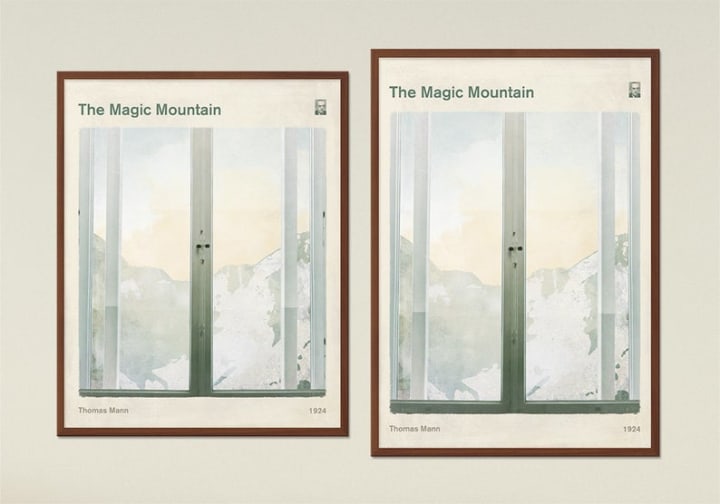
“A man lives not only his personal life, as an individual, but also, consciously or unconsciously, the life of his epoch and his contemporaries. He may regard the general, impersonal foundations of his existence as definitely settled and taken for granted, and be as far from assuming a critical attitude towards them as our good Hans Castorp really was; yet it is quite conceivable that he may none the less be vaguely conscious of the deficiencies of his epoch and find them prejudicial to his own moral well-being. All sorts of personal aims, hopes, ends, prospects, hover before the eyes of the individual, and out of these he derives the impulse to ambition and achievement. Now, if the life about him, if his own time seems, however outwardly stimulating, to be at bottom empty of such food for his aspirations; if he privately recognises it to be hopeless, viewless, helpless, opposing only a hollow silence to all the questions man puts, consciously or unconsciously, yet somehow puts, as to the final, absolute, and abstract meaning in all his efforts and activities; then, in such a case, a certain laming of the personality is bound to occur, the more inevitably the more upright the character in question; a sort of palsy, as it were, which may extend from his spiritual and moral over into his physical and organic part. In an age that affords no satisfying answer to the eternal question of 'Why?' 'To what end?' a man who is capable of achievement over and above the expected modicum must be equipped either with a moral remoteness and single-mindedness which is rare indeed and of heroic mould, or else with an exceptionally robust vitality. Hans Castorp had neither one nor the other of these; and thus he must be considered mediocre, though in an entirely honourable sense.”
The Magic Mountain is one of Thomas Mann's most well-known novels after Death in Venice. The language of this novel has constantly been quoted and is used in order to explain the most abstract of ideas, and there is no doubt, bar his shady past, that Thomas Mann was a great writer—though not a very morally adept human being. His books, such as this one, are still studied internationally, and are considered to be not only the best novels of Germany, but the best novels internationally. The Magic Mountain, in my opinion, was possibly the best to showcase abstract ideas in some of the best quotations I have ever witnessed. It is raw, beautiful, and somewhat tragic.
Other German Novels That Could've Made the List:
Death in Venice by Thomas Mann—I told you, I was really on the edge between Death in Venice and The Magic Mountain, but in the end The Magic Mountain won.
Perfume by Patrick Suskind—It is another one of those novels that is on every single list for "best written books" or "best written modern fiction." I feel like it's slightly overdone.
Alone in Berlin by Hans Fallada—It was just a case of how good the language was and Alone in Berlin doesn't stand that great against the abstracts of The Magic Mountain. Sorry Fallada.
3. The Colony of Unrequited Dreams by Wayne Johnston (Canada)
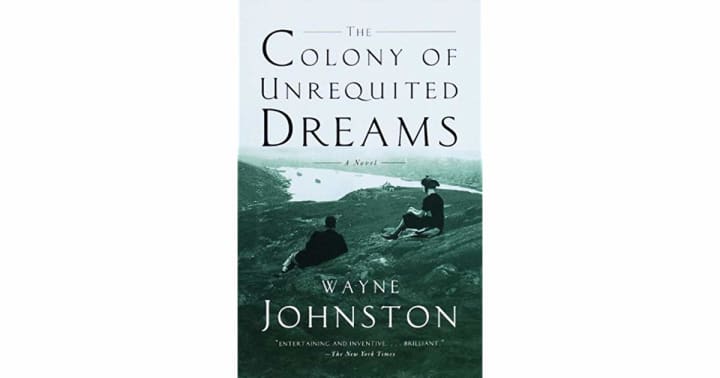
“I exhausted myself trying to take it all in, noting every little variation and departure from how things were supposed to be. My notion of home and everything in it as ideal, archetypal, was being overthrown. It was as though the definitions of all the words in my vocabulary were expanding at once. Cape Breton was much like Newfoundland, yet everything seemed slightly off. Light, colours, surface textures, dimensions – objects like telegraph poles, fence posts, mail boxes, which you would think would be the same everywhere, were bigger or smaller or wider by a hair than they were back home. That I was able to detect such subtle differences made me realize how circumscribed my life had been, how little of the world I had seen.”
The Colony of Unrequited Dreams is one of the greatest novels I have read in the last decade. I think its language use is very classic, and it has a similar air to it that say, Moby Dick has. There is so much emotional language that, at times, it feels so difficult to take it all in. The way in which the character describes experiences as well tends to be something of beauty, but also of sadness. There's always something satirical but melancholic there. It is such a brilliant Canadian Novel.
Other Canadian Novels That Could've Made the List:
Life of Pi by Yann Martel—Again, this is classic case of the overly popular book. We all agree that this is a great book, now let's move on and have a look at something else.
Three Day Road by John Boyden—This novel is so good that I was about to put it on the list, but then I remembered that Wayne Johnston's novel existed. It is just the case of Johnston's novel echoing more of Canadian History than Boyden's novel does.
Monkey Beach by Eden Robinson—This one was one that I liked, but I wasn't sure that everyone else would. Read it for yourself if you wish, but I wanted the list to be accessible too. This is simply a bit obscure.
2. A Brief History of Seven Killings by Marlon James (Jamaica)
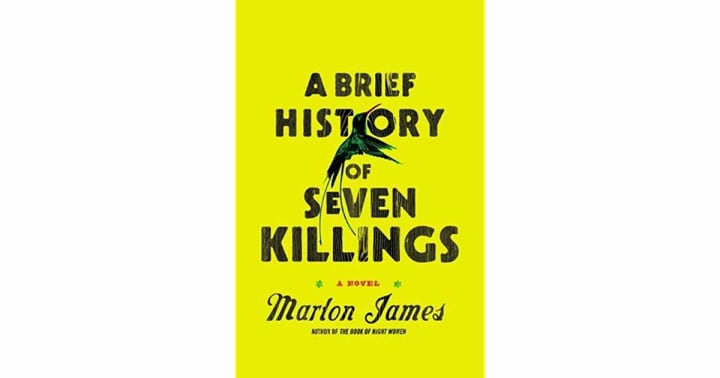
“There’s a reason why the story of the ghetto should never come with a photo. The Third World slum is a nightmare that defies beliefs or facts, even the ones staring right at you. A vision of hell that twists and turns on itself and grooves to its own soundtrack. Normal rules do not apply here. Imagination then, dream, fantasy. You visit a ghetto, particularly a ghetto in West Kingston, and it immediately leaves the real to become this sort of grotesque, something out of Dante or the infernal painting of Hieronymus Bosch. It’s a rusty red chamber of hell that cannot be described so I will not try to describe it. It cannot be photographed because some parts of West Kingston, such as Rema, are in the grip of such bleak and unremitting repulsiveness that the inherent beauty of the photographic process will lie to you about just how ugly it really is.”
A Brief History of Seven Killings is one of those books that just sends a damn shiver down your spine. It is a brilliantly clever book with some incredible quotations. I wish I could share more of them with you! There is something that sounds very raw and authentic in this book, as if it isn't a story at all—instead you're reading an experience. It is unforgettable in its use of description. The atmosphere of Jamaica without romanticising it, and the way in which we know it through other, more distant novels, is entirely different to what Marlon James gives us. It is one of the finest novels of the 21st Century without a shadow of a doubt.
1. Anna Karenina by Leo Tolstoy (Russia)
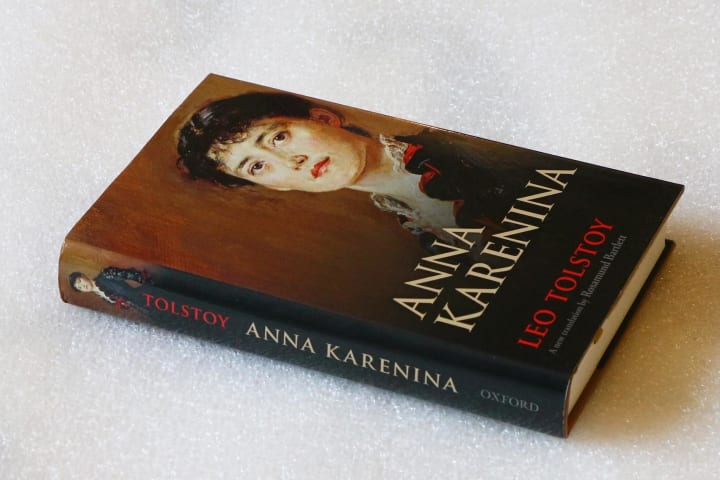
“When Levin thought what he was and what he was living for, he could find no answer to the questions and was reduced to despair; but when he left off questioning himself about it, it seemed as though he knew both what he was and what he was living for, acting and living resolutely and without hesitation.”
I know that this one is possibly the one book that is known as the greatest novel ever written, but I wanted to share it with you because it is so close to my heart. I read Anna Karenina every other month, or whenever I can, because it reminds me that each aspect of humanity has light and dark, it teaches me about getting through the bad times and reaching the end to find out what the lesson really was. This book is the teacher of humanity, it is the grand novel that lets us into life's best kept secrets about why we feel the way we do. No matter how melancholic, no matter how ecstatic and no matter how in love or how hateful we feel, there is a lesson in Anna Karenina for every single one of those emotions. The language is overwhelmingly beautiful with a three-dimensional perspective that translates the abstract into the physical, and then back again. It is one of literature's greatest treasures.
Other Russian Novels That Could've Made the List:
The Brothers Karamazov by Fyodor Dostoevsky—Now this is my personal favourite Russian Novel, and one of my personal favourite novels of all time. But, I have heard that many people aren't too keen on it, so give it a read for yourself and tell me what you think.
Dead Souls by Nikolai Gogol—a brilliantly dark and delicious novel, it doesn't really give the same reality that Anna Karenina does. It isn't as accessible to all readers.
War and Peace by Leo Tolstoy—though it is endearing, it really isn't everyone's favourite and I find that the language sometimes is more jittered than the smoothness of Anna Karenina. So between the Tolstoy novels, it has to be Anna Karenina, though I love War and Peace too.
About the Creator
Annie Kapur
200K+ Reads on Vocal.
English Lecturer
🎓Literature & Writing (B.A)
🎓Film & Writing (M.A)
🎓Secondary English Education (PgDipEd) (QTS)
📍Birmingham, UK






Comments
There are no comments for this story
Be the first to respond and start the conversation.